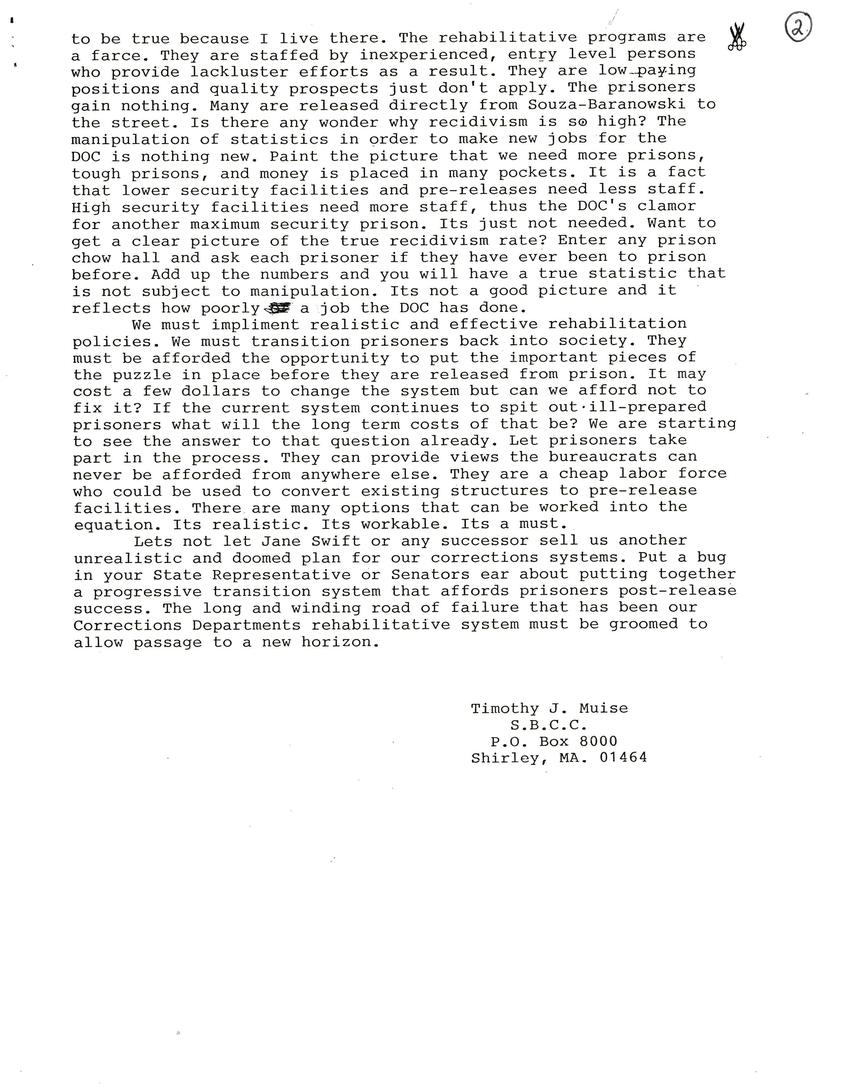
Transcription
(1)
As of late there have been many stories in the papers and on the airways about how many prisoners will be released directly on to our city streets this upcoming year. Recidivism rates, post-release supervision, and violent sexual offender registry programs are always part of the focus of these pieces. Time Magazine recently printed an article that stated a record 630,000 prisoners will be released to our nations streets this year alone. A staggering figure. If these prisoners had in place a workable and realistic post-release plan that included housing, employment, a support network, and specific need meeting counseling set-up, It wouldn't be such a scary proposition for the general public. The sad, and unnecessary fact is that the majority do not.
Tough on crime legislation of the late 80's and early 90's brought on such measures as Massachusetts "Truth in Sentencing" laws and similar statutes in other states. The rate that early-release, supervised paroles were given out chopped so much that it's considered a non option to most prisoners. You complete your sentence behind prison walls where rehabilitative opportunities are almost non-existent and what is offered is laughable. A prisoner goes from the animalistic attitude of a high security level prison directly to the streets of our cities and towns. The chances for success are dim. I am quite sure this is not the outcome that the tough on crime banner wavers had in mind, but it has certainly become the reality. How do we combat the high recidivism rates? Obviously longer sentences and reduced parole opportunities are not the answer. The answers may well be best understood if brought forth from the prisoners themselves. We know what works. We can give a clear picture of what is not working.
The system here in the great Commonwealth of Massachusetts has dealt with the problems in an ill equipped manner. The addition of more maximum security housing does nothing towards the means of rehabilitation. The re-offending of the popular that is being released from Massachusetts prisons is a clear indicator of this. To make the system work you must add comparable matching numbers of lower security and pre-release facility beds. This would allow for motivated prisoners to have a gradual transition period which would afford them the all important opportunity to put in place employment, housing, support systems, and treatment needs BEFORE they exit the prison system. It is the only solution that will work. You cannot expect a system that thrusts totally unprepared prisoners onto the street to be effective.. Affording prisoners the opportunity to gradually progress to greater levels of responsibility and opportunity on a basis of their individual behavior and adjustment is a good deal for all involved.
The prisoner gains a less harsh and more productive environment in which to live. The guards who oversee these prisoners deal with less incidences of misbehavior as prisoners don't want to loss the opportunity to advance to better living conditions. The public has more prepared and motivated prisoner6 released on to their streets. The concept of rehabilitation can become a reality.
Massachusetts has added over a thousand maximum security prison beds to their system while adding under 20 pre-release beds in over 15 years. In fact one of the largest and most successful pre-release facilities was just shut down. There has been talk of building another maximum security facility like the Souza-Baranowski Correctional Center, but no talk of adding lower security or pre-release housing. The same mistakes are going to be made again if that happens. The Department of Corrections manipulates statistics to fit whatever their latest need is. At the time the plans to build the Souza-Baranowski facility were being put forth they put forth numbers that indicated the need for housing for dangerous prisoners. That facility today is filled with many prisoners including the elderly, handicapped, non-violent offenders, and many other types that don't fit the maximum security bill, just to fill bed space. I know this
(2)
to be true because I live there. The rehabilitative programs are a farce. They are staffed by inexperienced, entry level persons who provide lackluster efforts as a result. They are low-paying positions and quality prospects just don't apply. The prisoners gain nothing. Many are released directly from Souza-Baranowski to the street. Is there any wonder why recidivism is so high? The manipulation of statistics in order to make new jobs for the DOC is nothing new. Paint the picture that we need more prisons, tough prisons, and money is placed in many pockets. It is a fact that lower security facilities and pre-releases need less staff. High security facilities need more staff, thus the DOC's clamor for another maximum security prison. It's just not needed. Want to get a clear picture of the true recidivism rate? Enter any prison chow hall and ask each prisoner if they have ever been to prison before. Add up the numbers and you will have a true statistic that is not subject to manipulation. It's not a good picture and it reflects how poorly a job the DOC has done.
We must impliment realistic and effective rehabilitation policies. We must transition prisoners back into society. They must be afforded the opportunity to put the important pieces of the puzzle in place before they are released from prison. It may cost a few dollars to change the system but can we afford not to fix it? If the current system continues to spit out ill-prepared prisoners what will the long term costs of that be? We are starting to see the answer to that question already. Let prisoners take part in the process. They can provide views the bureaucrats can never be afforded from anywhere else. They are a cheap labor force who could be used to convert existing structures to pre-release facilities. There are many options that can be worked into the equation. It's realistic. It's workable. It's a must.
Let's not let Jane Swift or any successor sell us another unrealistic and doomed plan for our corrections systems. Put a bug in your State Representative or Senator's ear about putting together a progressive transition system that affords prisoners post-release success. The long and winding road of failure that has been our Corrections Departments rehabilitative system must be groomed to allow passage to a new horizon.
Timothy J. Muise
S.B.C.C.
P.O. Box 8000
Shirley, MA. 01464
Other posts by this author
|
2017 jun 24

|
2017 jun 24

|
2017 jun 24

|
2017 jun 24

|
2017 jun 18

|
2017 jun 15

|
More... |



Replies (1)